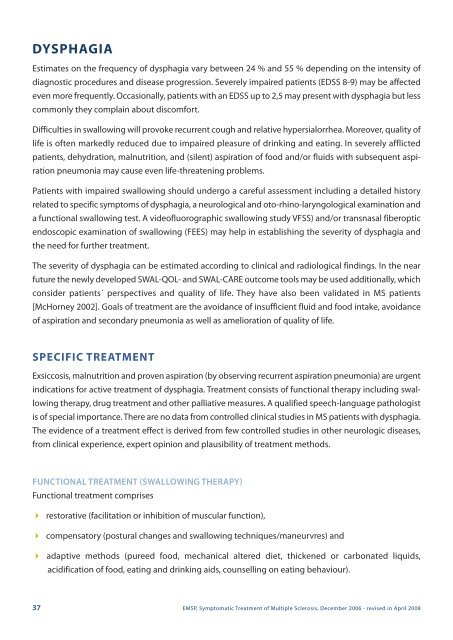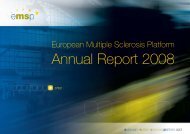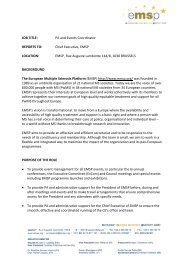Symptomatic Treatment of MS - European Multiple Sclerosis Platform
Symptomatic Treatment of MS - European Multiple Sclerosis Platform
Symptomatic Treatment of MS - European Multiple Sclerosis Platform
Create successful ePaper yourself
Turn your PDF publications into a flip-book with our unique Google optimized e-Paper software.
DYSPHAGIA<br />
Estimates on the frequency <strong>of</strong> dysphagia vary between 24 % and 55 % depending on the intensity <strong>of</strong><br />
diagnostic procedures and disease progression. Severely impaired patients (EDSS 8-9) may be affected<br />
even more frequently. Occasionally, patients with an EDSS up to 2,5 may present with dysphagia but less<br />
commonly they complain about discomfort.<br />
Difficulties in swallowing will provoke recurrent cough and relative hypersialorrhea. Moreover, quality <strong>of</strong><br />
life is <strong>of</strong>ten markedly reduced due to impaired pleasure <strong>of</strong> drinking and eating. In severely afflicted<br />
patients, dehydration, malnutrition, and (silent) aspiration <strong>of</strong> food and/or fluids with subsequent aspiration<br />
pneumonia may cause even life-threatening problems.<br />
Patients with impaired swallowing should undergo a careful assessment including a detailed history<br />
related to specific symptoms <strong>of</strong> dysphagia, a neurological and oto-rhino-laryngological examination and<br />
a functional swallowing test. A vide<strong>of</strong>luorographic swallowing study VFSS) and/or transnasal fiberoptic<br />
endoscopic examination <strong>of</strong> swallowing (FEES) may help in establishing the severity <strong>of</strong> dysphagia and<br />
the need for further treatment.<br />
The severity <strong>of</strong> dysphagia can be estimated according to clinical and radiological findings. In the near<br />
future the newly developed SWAL-QOL- and SWAL-CARE outcome tools may be used additionally, which<br />
consider patients´ perspectives and quality <strong>of</strong> life. They have also been validated in <strong>MS</strong> patients<br />
[McHorney 2002]. Goals <strong>of</strong> treatment are the avoidance <strong>of</strong> insufficient fluid and food intake, avoidance<br />
<strong>of</strong> aspiration and secondary pneumonia as well as amelioration <strong>of</strong> quality <strong>of</strong> life.<br />
SPECIFIC TREATMENT<br />
Exsiccosis, malnutrition and proven aspiration (by observing recurrent aspiration pneumonia) are urgent<br />
indications for active treatment <strong>of</strong> dysphagia. <strong>Treatment</strong> consists <strong>of</strong> functional therapy including swallowing<br />
therapy, drug treatment and other palliative measures. A qualified speech-language pathologist<br />
is <strong>of</strong> special importance. There are no data from controlled clinical studies in <strong>MS</strong> patients with dysphagia.<br />
The evidence <strong>of</strong> a treatment effect is derived from few controlled studies in other neurologic diseases,<br />
from clinical experience, expert opinion and plausibility <strong>of</strong> treatment methods.<br />
FUNCTIONAL TREATMENT (SWALLOWING THERAPY)<br />
Functional treatment comprises<br />
� restorative (facilitation or inhibition <strong>of</strong> muscular function),<br />
� compensatory (postural changes and swallowing techniques/maneurvres) and<br />
� adaptive methods (pureed food, mechanical altered diet, thickened or carbonated liquids,<br />
acidification <strong>of</strong> food, eating and drinking aids, counselling on eating behaviour).<br />
37 E<strong>MS</strong>P, <strong>Symptomatic</strong> <strong>Treatment</strong> <strong>of</strong> <strong>Multiple</strong> <strong>Sclerosis</strong>, December 2006 - revised in April 2008






